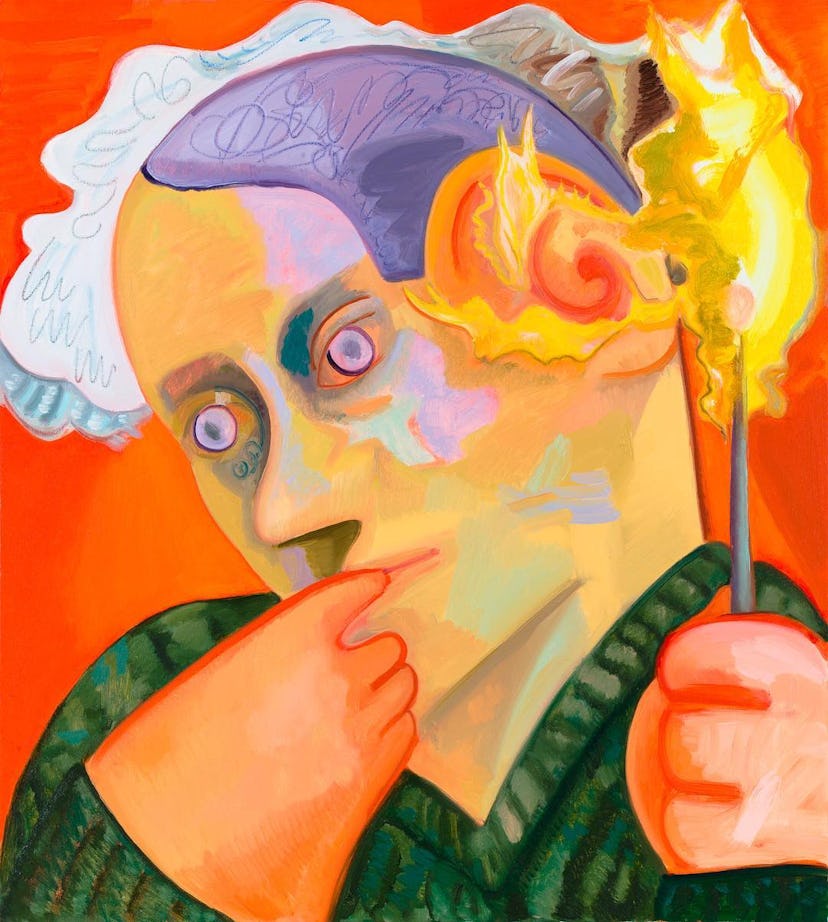The Dana Schutz Open Letter War Has Now Roped in the Likes of Marina Abramovic and Cindy Sherman
Over 80 artists have signed a letter defending Schutz, months after her painting of Emmett Till first caused an uproar at the Whitney Biennial.

Earlier this year, the artist Hannah Black practically tore the art world apart when she published an open letter on Tumblr attacking the 2017 Whitney Biennial, which at that point had been widely praised for its brazen embrace of politics. One work in particular, though, stuck out to Black—and to hordes of other online and IRL protestors who took to physically blocking it: Open Casket (2016), a canvas depicting the well-known photograph of the lifeless, mangled corpse of Emmett Till, the black 14-year-old who was lynched in 1955 for allegedly flirting with a white woman.
The artist, Dana Schutz, also happens to be a white woman, which is why Black accused her of “transmut[ing] Black suffering into profit and fun,” even if she set out to do so with good intentions. “Those non-Black artists who sincerely wish to highlight the shameful nature of white violence should first of all stop treating Black pain as raw material,” Black continued, eventually urging the biennial’s curators, Mia Locks and Christopher Y. Lew, to not only remove the painting from the exhibition, but also to destroy it.
The pair did neither, though they did make (non-apologetic) statements of their own, meet with a protestor, organize a discussion attended by Claudia Rankine and Malia Obama, and append a statement written by Schutz next to the painting in the museum where the artist clarified that she never intended to sell Open Casket, and was instead approaching the photo, which Till’s mother famously published in Jet magazine to “let people seen what I’ve seen,” from a parental perspective. (“I don’t know what it is like to be black in America but I do know what it is like to be a mother,” she told the New York Times, before further explaining her reasoning in a conveniently timely New Yorker profile.)
Fast-forward five months later. The biennial, long forgotten, has since been replaced by the pop-up beaches, parrots, and foam pits that make up Hélio Oiticica’s tropical playground at the Whitney. Still, the controversy has returned this month, thanks to a new survey of Schutz’s work at the Institute of Contemporary Art in Boston, which—you guessed it—has already generated protests and calls to have it pulled and cancelled, most notably in an open letter by local artists, activists, and members of the community who accused the institution of capitalizing on Schutz’s new notoriety, and of “institutional backing of this type of violent artifact.”
To be clear, even though the show focuses on the last 10 years of Schutz’s work, Open Casket is not and had never been part of the exhibition (it is addressed in a small portion of the show’s wall text). And it should also be noted that the survey has been in the works long before the controversy at the Whitney. Still, to major art world names like Cindy Sherman, Marina Abramovic, Chuck Close, Kara Walker, and Ed Ruscha, disregarding all of Schutz’s recent oeuvre just because of one recent transgression would amount to censorship—a view they, along with around 80 other members of the National Academy, made clear this week in an open letter declaring their “unequivocal support” for Schutz, whom they describe as being “recently excoriated by a group of Boston artists.”
“As fellow artists and architects, we wholeheartedly support cultural institutions like the ICA-Boston who refuse to bow to forces in favor of censorship or quelling dialogue,” the letter continues. “It is also of the utmost importance to us that artists not perpetrate upon each other the same kind of intolerance and tyranny that we criticize in others.”
The letter also supports the ICA’s decision to “maintain programming that fosters conversations between people with different points of view, especially given our current political climate of intolerance.” (The museum has organized two talks and forums to address the controversy in September.)
It’s notable that several of the artists who signed the letter have lived down similar controversies. Marina Abramovic came under fire last year when she compared aboriginal Australians to dinosaurs in an early (later edited) version of her memoir. Cindy Sherman, as beloved as she is these days—the mere act of making her Instagram public this week practically broke the internet—once survived “#CindyGate,” after the internet dug up some of her earliest self-portraits, at age 22, in which she posed in black-face. Even a black artist like Kara Walker, who is famous for tackling slavery and racism in her work, is not immune to social critics; she was once was the target of the black artist Betye Saar’s letter-writing campaign to censor and destroy her work back in 1999.
Related: The Protests and Reactions to Dana Schutz’s Painting of Emmett Till in the 2017 Whitney Biennial
See Kendall Jenner, Performance Artist, Channel Icons Like Marina Abramovic and Yoko Ono: